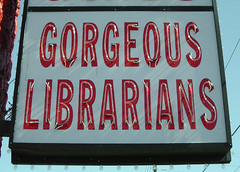
Romance is a time-honored genre, from Wuthering Heights to Barbara Cartland. Though not a personal favorite, romance novels have provided us guilty pleasure from time to time --enough to recognize the standard of identity: the dangerous, anhedonic hero, the heroine who cannot believe her good luck, the heating of blood, and the bruising of lips. Typically, any serious bodice ripping is reserved for after the wedding, though the couples' troubles are rarely resolved by that event. Indeed, Miss Shelved suspects romance novel central relationships must border on the abusive in order to be worth reading about. Romance is a special form of fantasy, an escape in which no mature reader truly believes. Much as we adore them, we cannot imagine asking Heathcliff to pick up the dry-cleaning or Max DeWinter to carpool for soccer. Nor would we want to.
Escapism, even sublimation, is rife in children's literature as well. Just think of all the adventures made possible by the absence of parents (dead, kidnapped, or what-have-you) -- none of which make children yearn to be orphans. From time to time some pious infant will bring a book to Miss Shelved's attention for its bad words, violence, or depiction of naughtiness. We gently suggest that it is possible to read about misbehavior without running out and committing it. Reading about things one might never do is part of what makes a book exciting. The better part of children's fiction involves scrapes that would whiten a parent's hair, yet we see few budding Artemis Fowls, Alex Riders, or even George and Harolds amongst our young readers. So why are we suffering such qualms over Stephanie Meyer's Twilight books?
One supposes the first issue is how much romance is appropriate for the preteen reader? Much fine kid-lit includes the first fumbling attraction between a boy and girl, even a little gratuitous snogging (Lavender and Won-won, anyone?) But it is peripheral to the plot, not the center. The Twilight books, now being picked up by many 10-11 year olds, have all the standards of identity of adult romance novels. The setting is high school -- indeed there is far too much verbiage wasted on who sits with whom at lunch and other minutia. The vampire hero exudes all the self-loathing and sexual heat of an Anne Rice character. Yet nothing happens despite his regularly spending the night in the same bed with the 17-year-old heroine. It is a melange of High School Musical, The Vampire Lestat, and Fear of Flying. Much is made of the old-fashioned morality of the tale: no pre-nuptial congress (human or vampiric) will be countenanced by the gentlemanly Edward, no matter how much Bella wants it. Still, time and again the couple comes to the brink before Edward pulls back and makes the wise choice for the both of them. It is worth noting that the most overused adjective applied to Edward (other than gorgeous) is smug. The most overused adjectives applied to Bella, on the other hand, are sullen, glaring, and pouting. Indeed.
So, do these books belong in an elementary school library? Can they reasonably be viewed as escapism for 10-11 year old girls? Can girls at that age distinguish between the reality and the fantasy of the relationship? Do they see the abuse? Or will they learn to expect "true" romance to include 24/7 attention, stalking, emotional blackmail, not to mention lots of unsupervised private time in rooms with large beds? Miss Shelved does not have the answers -- but would prefer to defer the questions until at least junior high.


























